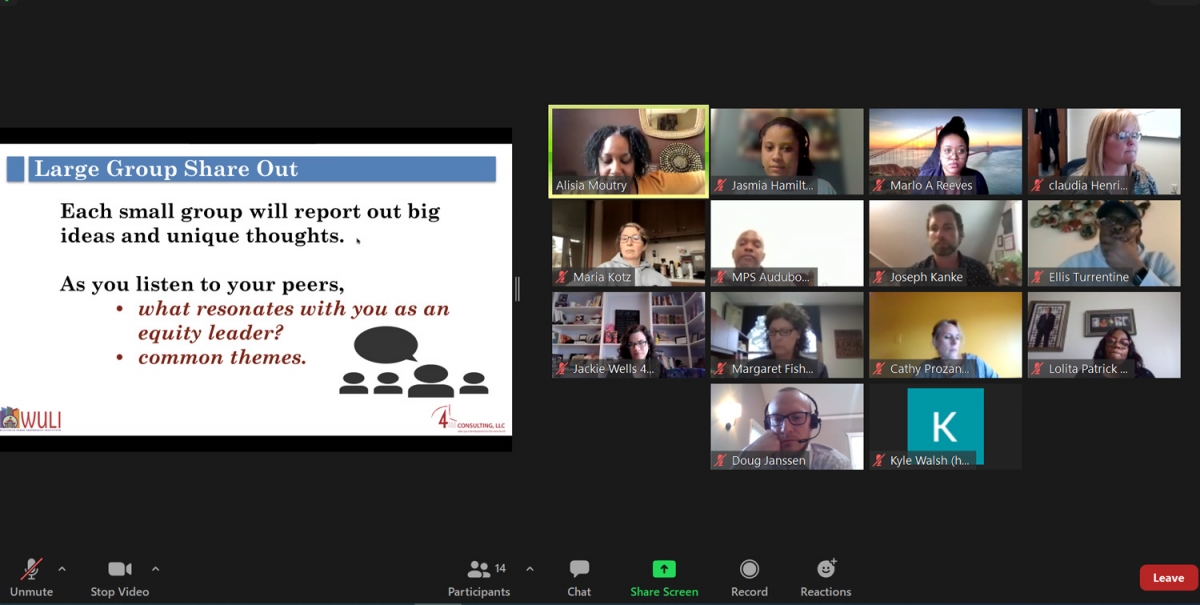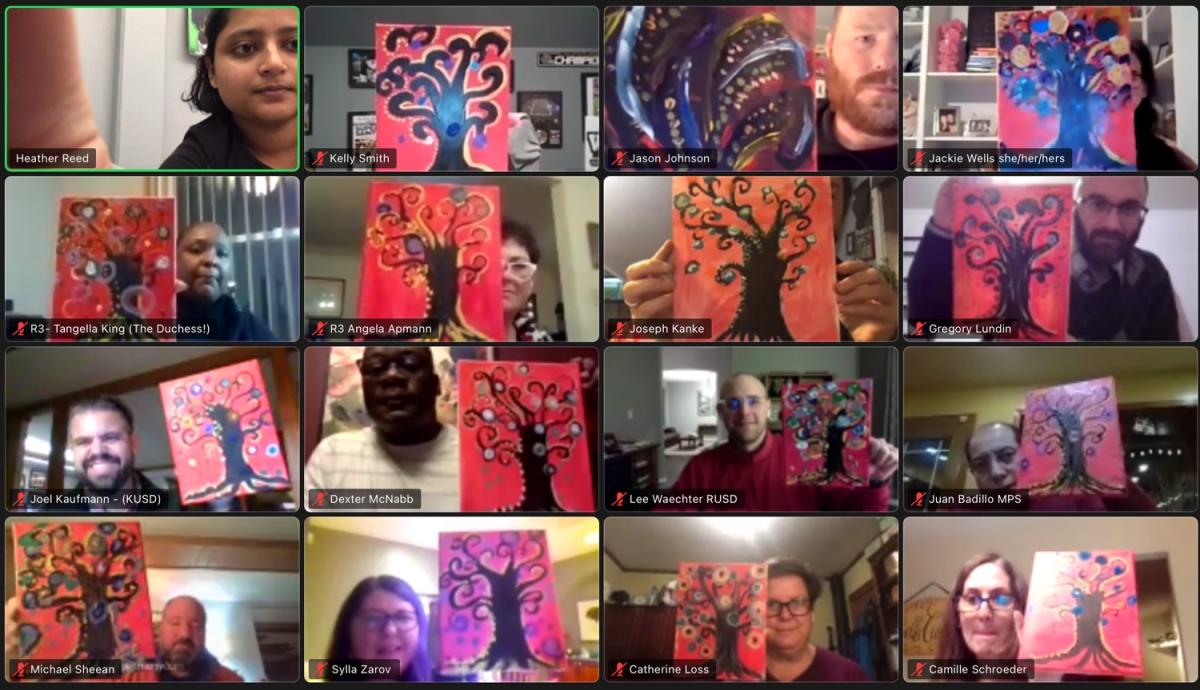The WULI Experience
Professional Learning Series
The Leadership for Equity approach employs a holistic, systemic lens to educational equity that attends to and drives strategic equity interventions and innovation at the individual, interpersonal, and systemic levels. The professional learning series is supported by expert co-facilitators, rich learning materials, and action-oriented adult learning design.
The WULI experience begins with a half-day kick-off followed by a sequence of five professional learning series which define the Leadership for Equity approach. Each series consists of two full-day sessions:
1. Discovering Self as Equity Champion
Participants will engage in a needs assessment and begin to learn how to develop a professional learning community centered on trust, vulnerability, safety, and sharing. Participants will demonstrate a growth mindset as a public learner and establish critical friendships.
2. Developing Cultural Competence
Participants will engage in deepening their understanding of the history of racism, examine their implicit bias and its impact on their leadership, and develop the facilitative skills needed to engage in courageous conversations around the impact of race on equity with staff.
3. Building a Culture of Excellence with Equity
Participants will understand the systems and conditions necessary for creating a culture where all students, especially students of color, and staff feel a sense of belonging and relationship; there are high expectations for both adults and students; and the necessary support for success is provided.
4. Designing a School Improvement Strategy for Results
Participants will understand and leverage how to use data and iterative cycles of inquiry to develop, and monitor a strong improvement strategy for results. Distributed leadership for collective efficacy and impact will be central to this learning. Participants will understand and ensure family-centric engagement and community resource integration.
Coaching
Participating fellows are supported in the further development of their equity leadership skills through one-on-one coaching. Coaching for WULI is done in partnership with the Wisconsin Statewide Coaching Coordinator. Coaching sessions are offered quarterly and are designed around the following focus areas:
- Deepening learning and reflection on topics introduced in the institute
- Applying learning to the local context or school building
- Engaging in real-time thought-partnership on educational equity and school improvement
Capstone
The WULI Capstone is designed to help principals document their learning during the professional learning series. The capstone is completed in phases that mirror the key themes and outcomes of the institute. Questions for reflection and action are embedded in a design thinking process allowing participating fellows to make strong connections between the core learning and their unique school context.
Participant Insights
- “The reading was clarifying and reinforcing. Also, the opportunity to 'meet' with other participants was helpful in making this experience better for me personally. What resonated with me is the historical and current facts about racism that help to put a perspective on how race is viewed today in the US. In the immediate future, I am happy to be back in a think tank, of sorts. When speaking specifically about the reading, it gives me another piece of information to provide credibility to conversations that I have.”
- “I enjoyed the district sharing and I also really liked the consultancy protocol and I think that will be useful in discussing issues of equity. I think the consultancy protocol can take out the 'expert' role of leader and make it easier to discuss the problem or issue that may come up. I would like to use the consultancy protocol during our grade level meetings or during post observations when we are discussing different issues that come up at school from an equity standpoint either in developing curriculum, delivering curriculum or in working or other tasks at school.”
- “What resonated the most for me was going through the strategies to confront race and bias every day. The reason that it resonated with me is that I like to think that interrupting bias as it occurs may be easy but according to the definition, interrupting 'when you feel strongly' or 'when it strikes you' is not enough. You can only do this if and when you do it ALL THE TIME, without exception. That is a scary thought because subconsciously, I know that I, myself may fall into a bias mindset or stereotype people/situations. So how can I say I am an 'interrupter' when I happen to be the person engaging in subconscious inequity at times? Does that make sense? My next step is to plan time/space for ongoing conversations around stereotypes, race, and bias. I want to give staff the opportunity to engage and struggle with these difficult conversations like I have. However, I do not want to 'force' everyone in at once. I will let these spaces be voluntary with the hope that a few 'sparks will ignite a fire' across the school (eventually, not right away).”


Resources
Equitable Leadership Learning
Equity focused Leadership Competencies
-
Leadership Academy Equity Leadership Dispositions
Cultural Competence
-
Zaretta Hammond’s Culturally Responsive Teaching and The Brain: Promoting Authentic Engagement and Rigor Among Culturally and Linguistically Diverse Student
-
Free online professional development Project READY: Reimagining Equity & Access for Diverse Youth
School Culture
-
Classroom Culture strategy feature from PEFA
-
A Resource for Equitable Classroom Practices 2010 by Montgomery County Public Schools, Maryland
School Improvement
-
The Education Trust Re-Imagining Outcomes-Based Funding
-
WestEd Four Domains for Rapid School Improvement A Systems Framework
Family and Community Engagement
-
DPI District-Wide Strategies for Meaningful Family Engagement
-
DPI Trauma-Sensitive Schools Engaging Parents as Partners Professional Learning Module
-
California Department of Education Family Engagement Toolkit: Continuous Improvement through an Equity Lens
-
Center for Assessment and Policy Development How Can We Design Survey Interviews and Questionnaires to Give Us the Best Information Possible?
WULI Program Resources
- Informational Double-Sided Postcard
- Year 1 Evaluation
- Logic Model
- WI Urban Leadership Institute Cohort Alumni
Media Coverage
- Johnson, Annysa. 2018. “Wisconsin's largest school districts join in effort to target black-white achievement gaps.” Milwaukee Journal Sentinal. October 29.
Contacts
For curriculum and eligibility information:
Alisia Moutry, PhD
CEO, 4AM Consulting